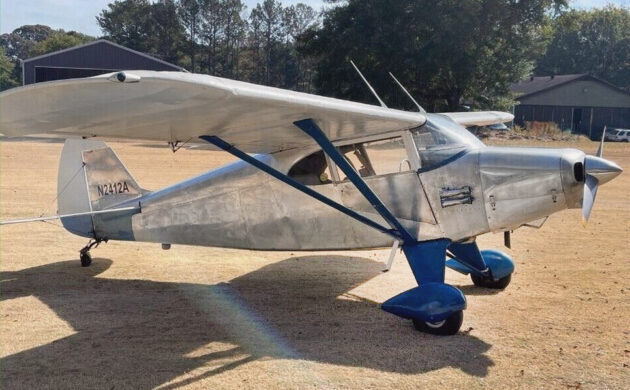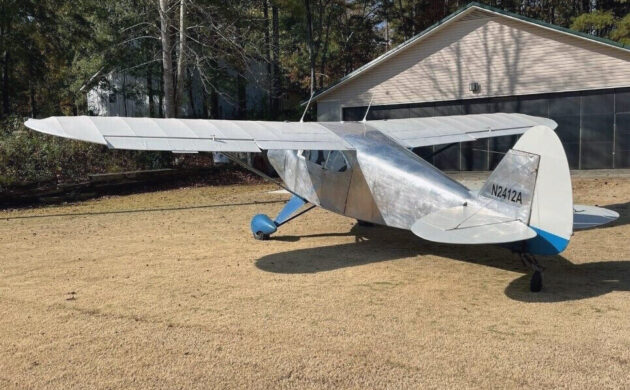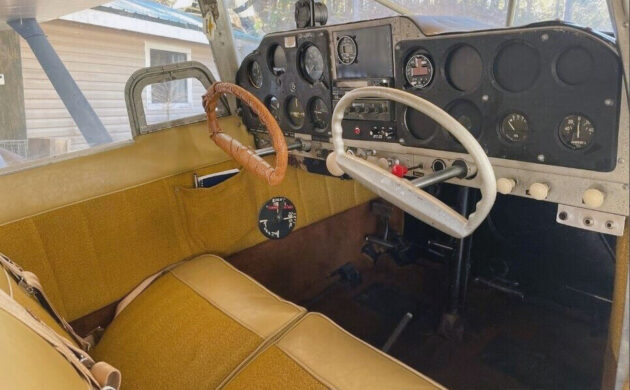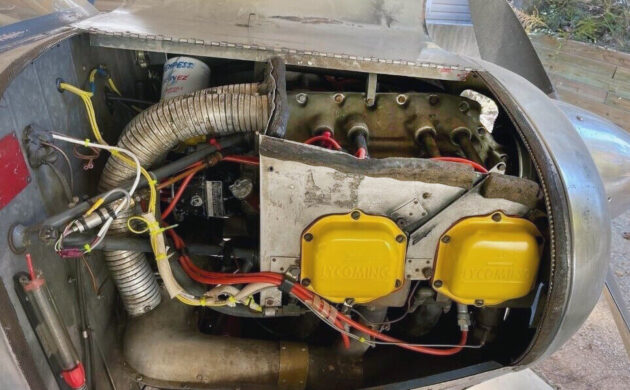If seeing a plane like this 1952 Piper PA-20 Pacer doesn’t make you want to get your pilot license, I don’t know what will. I’m an FAA-certified commercial drone pilot, but that training is a walk in the park compared to getting a full pilot license. The seller has this gorgeous Piper listed here on eBay in Woodstock, Georgia, and the current bid is $16,800, but the reserve isn’t met.
I don’t know if I’ve ever wanted a plane as much as I want this one. Of course, with just over a day left on the auction and several months’ worth of pilot training ahead of me if I were really serious about it, this one will be long gone. A friend-of-a-friend is a pilot, and he just bought a polished-aluminum plane, and it’s a work of art. I’m just imagining what this Piper Pacer would look like if it were shiny. Other than the wing, of course, which is covered with fabric.
Piper made several versions of the PA-20, including this PA-20 Pacer with the tailwheel landing gear, sometimes called taildraggers. They were a bit harder to handle on the ground with some visibility issues while on the ground. They also offered a PA-22 Tri-Pacer with better visibility and a nosewheel rather than the tailwheel on the PA-20. The “tricycle” landing gear was so popular that the Tri-Pacer sold six times as many. There was also a Tri-Pacer Caribbean, a less-expensive and less-powerful version, and a trainer version called the PA-22-108 Colt.
These strut-braced high-wing monoplanes were four-seaters, or you could take the rear seat out and use it for cargo, as the seller shows in this photo. Of course, two people can sit back there with the comfortable-looking rear seat in place. The PA-20 Pacer and PA-22 Tri-Pacer were the first Pipers after WWII to use flaps and not have a center control stick, instead using the more “modern” dual yokes as seen here. This Piper is intended to generally operate under VFR – Visual Flight Rules – as in nice, clear, non-stormy weather.
The seller says that this engine is a Lycoming 0-290-D2, a more powerful version of the 0-290-D. It’s an air-cooled, horizontally-opposed four-cylinder with 135 horsepower at 2,600 RPM. They say that it has a “JPI engine analyzer, digital oil temp and psi, ky97, 2 pl intercom”, it flies straight, and is ready to fly. Are any of you pilots? If so, what are your thoughts about this early-50s Piper Pacer?










As a kid growing up my Dad had a sweet ‘58 PA-22 Tri-Pacer, they’re great recreational aircraft, can’t count how many hours I spent in his Piper. Dad sold it to a bush pilot who took it to Alaska and flew it for several years until he sank it in Lake Ketchikan.
What’s not to like? Good looking, and fast for its type/hp. Two good sized men, some gear, and a full tank of gas will put you at max load though.
From what I heard the Pacer/Tri-Pacer were good reliable planes. There’s a guy I knew of who owned a Tri-Pacer and decided to convert it to a Pacer because he preferred a tail-dragger. I remember seeing him land in a crosswind and that rudder was sure moving to keep it straight. They say there’s (2) kinds of pilots who fly a tail-dragger; those who have ground-looped and those who are going to. A tail-dragger is notorious for wanting to loop while a nosegear wants to taxi straight ahead. My air time has always been with a nose-gear so I’ll never experience that sudden loop on the landing roll. And pressing Threescore + 10 I’ll probably only just have my memories, which were mostly fond. But damn! An airplane is an expensive toy…
Not to sound redundant, but as mentioned with every airplane post, I sorely regret not learning to fly. And don’t say, “it’s not too late”, trust me,,,I can’t even pay attention, much less $150/hr(?) to fly. It’s too late. If by some miracle, and don’t say “win the Powerball” either, THAT, my friends, only shows how greedy this country is, but sadly, that’s about what it takes today to enjoy this stuff. I always liked the top wing, but can’t understand why such a high dash? You can’t see over it, what’s the logic there? Now, would I trust my life to a glorified VW motor( tempers flaring, hold on) you bet. I think the opposed setup has more than proven itself in any situation.
Now,,,( here it comes), certain banner headlines trigger certain memories, of which Scotty seems to be the master of( Franco-American, etc), but “Barn Storming” triggers one such memory, and not good.
In case unfamiliar, “Barn Storming” was a practice stunt flyers would perform, dive bombing a large object, like a barn, in planes like this, and pull up at the last second( or fly through the barn). About 20 years ago, a friend and his 2 buddies, chartered a small plane into Canada, for a week long fishing trip. They contracted what seemed to be a reputable company, the pilot, just a kid, but had the qualifications. Upon reaching the remote lake in Canada, the pilot wanted to “Barn Storm” the cabin, where others had already made it, and watched in horror as the plane came in too low, clipped some trees, and went into the water. Nobody in the plane survived,,,
I have owned and have a lot of time in Super Cubs and Tri-pacers. Piper Pacer/Tri-Pacers are a wonderful entry point to ownership flying. Cheap to buy, relatively low cost to maintain, 100 MPH cruise and 6GPH makes an affordable flight. But after that is where it gets complicated. Landing the tricycle version is like any Cessna or other aircraft, but the tailwheel is much more active on landing and takes additional care. There is no benefit to a tailwheel in a Pacer. These are not Super Cubs, and even with a tailwheel they are limited by their low HP and short wings to mostly improved fields. It Can be used as a time builder, but a low time fresh pilot and tailwheel are not really advisable, although with training this can be a non-issue. Even with bigger engines and wing work, they just don’t perform like a Super Cub. The good part is that they cost a fraction of the price!
This one is at a good price point, but is unlikely to be sold there and I suspect the reserve is considerably higher. There is 600 hours remaining until an engine overhaul (that could run up to 20 grand!) and that needs to figure into the per flight hour cost. It is odd to see metal on the fuselage and not really a benefit since the fabric wings are what usually need recovering first. Leaving this tied up outside is a bad idea, and covered storage can be costly. The radios and engine instruments are adequate for puttering around. If you consider most recreational pilots aren’t flying 50 hrs/year, and the costs of hanger and upkeep, it is cheaper to be part of a flying club and fly a better aircraft than this for less out of pocket costs. But for the cost of a cheap car, this one can be yours. I still try to fly 50 hrs a year, which is kind of the bare minimum to keep proficient for VFR flight. I consider the 5K cost well worth the privileged experience even though it is about double the yearly price of having a 57 Chevy. My flying career will sunset before long and I cherish every flight now before I become permanently earthbound..
Wow, you guys are the best! That is outstanding information, thanks for that!
And Howard, if Aunt Bee can learn to fly… (kidding)
Back around 1978, a friend took me up in his 2 seater Cessna at the Palo Alto, Ca municipal airport. Once up, plane started sputtering snd dying…pilot called in mayday to tower; said he didn’t know if we could make it down for proper landing; asked him to ditch it in the marsh; he luckily got it down; found out later he missed his annual, said some spark plugs ready to fall out..morale of story, please know condition of plane before going up!
More likely he had carb ice and the ice was melting. As soon as the ice was melted it smoothed out.
PS: Spark plugs just don’t fall out!
I got my pilot’s license when I was 21 (early 70s) and had a ’48 Luscombe tail dragger. https://www.luscombeair.com/faa-airworthiness-directives-ad-s
They were a lot prettier than Cessnas.
Had almost same experience with someone not maintaining their plane. I no longer fly with anyone unless I know the plane has been maintained and safe as can be.
Jay, great comments and so right. I have a commercial pilots licence ,but at this point ,I don’t know if it is worth the paper it is printed on. My first ride in an airplane as a 12 year old kid was in a J-3 and I was immediately hooked. I am so glad for the time and my flying experience, but that was then and this is now. The easy part is the rating, the hard part is owning and operating the aircraft. The car addiction is compulsive and expensive. If you believe that is true don’t even think about an airplane. Unfortunately, I think about it a lot , but the answer is always the same. WTF are you just stupid!
I bought a ’48 Luscombe back in the mid 70’s for $3600 because it was rated for loops and rolls. Lost my job. Plane expenses went through the roof. And owning a small plane went out of the reach of the average person.
Had a buddy that was an FAA inspector for the airlineshere in MN. He owned Piper Cub, along with a few others. Made many a fishing trips into Canada with his float plane. He amazed me in the Cub when he landed it hands free. He landed using throttle/ airspeed only. He claimed, if you left the plane alone, it would take care of the flying.
A lot of money for an old, outdated VFR aircraft. It will likely sell, but better aircraft for the same money are out there, with aluminium wings. Recovering the wings is anywhere from $14,000.00 to highs in the 30s. No thanks.
Never seen one metalized… common on Stinson 108’s, but not these. Pretty well cared for, new Avionix EFIS horizon, ADSB. A lot of “put-put” plane for the money. Shortwing Pipers have a following and are faster than than the others, but true don’t do the short/rough field as well. O-290-D2 is good motor, although parts are getting quite scarce, 600 hrs is a long time in this plane. Doesn’t mention the wings needing cover, and they can be done with friend’s help for as cheap as a couple grand with final painting. Look at single prices these days… this ain’t bad. Yes, I am an antique restorer type IA A&P.
I used to help my uncle restore wartime Taylorcraft planes. The were tube and fabric. I welded many tubes and welded up many engine cowls. He did the fabric work. If you had the time and did the research, you could do this work.
I knew a lot of locals who covered their own airplanes. One guy restored a 1933 Waco and not only covered it himself but built all the ribs for the wings. All I can think of is the sore fingertips from the rib-stitching. I had a guy stop in at the local coffeeshop for a chat. He told me a rather humorous story about picking up some Dope for a covering project.https://gearheadsncoffeestains.blogspot.com/2012/05/party-line.html
The seller has over 1,000 items listed, mostly cars, trucks and planes.
There was no carb ice as it was 70 degrees out, and I said the plugs were ready to fall out…not that they fell out…
Forcing air into a carb reduces the air temp so that, if there is any moisture present, ice can form in the carb – EVEN at 70 degrees. Hence the necessity of using Carb Heat, especially when throttling back the RPMs.
Airplane carbs will freeze up in hot temps. That why you pull carb heat on take-off.
Yes, you can get carb ice in high humidity situations even when its hot, but I have never heard of taking of with carb heat on. At full throttle it is highly unlikely you will ever get carb ice, which usually occurs when the throttle is reduced.
This ad brings back the thought of qualifying for a pilot’s license. Unfortunately I am too old and don’t have the funds
free enough to take the training, Planes like this one awake the desire to be able to take off and soar.
Neil, Your Buddy is obviously a professional and right. I like many other Pilots started learning to fly in a Cessna 150. It was a great training airplane. I think many new students who just soloed , the instructor’s speech was if you get in trouble “Let go of the Airplane” in other words let go of the controls. The airplane will easily go back to straight and level. If you have enough altitude. I am sure that quality saved many student pilots. I was lucky, I never had to use that maneuver, but it seems way better than a Parachute.
I am surprised no one has commented on how airplanes don’t belong here on BF, etc.
And I am also fascinated by the information contained in the comments that are here for this one.
And admittedly, I took one look at that 135 HP motor and also couldn’t imagine trusting it with my life in the sky.
I understand your thinking, but really… howmany vehicles on here are actually ” Barn Finds”? I learned to just enjoy the variety of different submissions, and all the knowledge I didn’t realiz I lack.
Plus… re: this plane post: Have you seen the number of comments? Seems a lot of motor heads just aren’t interested in the ground pounders. Just enjoy,or skip over what your not interested in.
No Neil, I don’t believe you did understand my thinking. I was not complaining about the inclusion of this plane on BF. My initial comment was that NO ONE had yet complained about that. I most definitely enjoy the variety of submissions and the subsequent information provided. That was what I stated. Sorry if that was not clear to you.
What a load of crap.
Lycomings are not glorified volkswagen engines.
What am I missing, matt, did someone say that they were? I don’t see that in any of the comments and I certainly didn’t say that in the article.
Actually if you take the principle of the Boxer engine, a lot of makers used that principle. I don’t know if it was VW or Lycoming, or someone that has long since disappeared who pioneered it. The fact is, a lot of engine builders used the boxer as a yardstick for engine production. It made the profile a lot shorter to increase visibility in an airplane, and allow more ground clearance in an automotive application. Now I’ve seen lots of these engines apart and it’s somewhat scary to see how small the crankshaft is compared to the pistons. Like, the pistons are huge and dwarf the rods and crankshaft. But the designers have determined that it’s all strong enough to keep the plane up in the air until it’s time to pull that engine for a major. All said, it’s sure nothing to get bent out of shape over…
A Lycoming O-290-D2 is like a 4.7 Liter tugboat engine and the reason that the dash is so high is the the propeller is six feet in diameter and needs ground clearance when the plane is in the horizontal flight attitude.
Ended at $20,305, Reserve Not Met.
Good to see a plane again on junkyard, Jay nailed it, as usual, Neil is right about the landing trick with the Cub, 45 years ago, 2 old timers demonstrated exact same thing to me as a student, no cross winds, they always said, light touch on the controls, the plane will fly itself.
I started flying in 1965, got my Commercial Pilot License in 1968. We owned a Piper PA-12 , later a Cessna 140. Tailwheels are no big deal to handle, 10 or so hours practice and you’ve got it. Curious about the metal on the fuselage of this PA-20, normally fabric. First question that I would ask is “is it approved?”. If it is not FAA approved via STC (supplemental type certificate) or a FAA field approval , then you have a problem. Worth little if not approved..
Oh, lighten up,,
Thinking back, I am sure I saw the stick in front of me move a little bit, but I got the point, fun times.